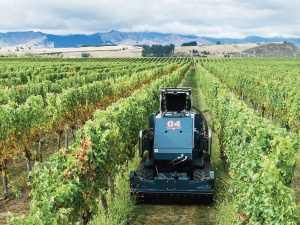Callaghan Innovation: Connecting industry problems with startup solutions
Gaining exposure to relevant innovation, "without being swamped in the sheer volume of options", is one of the main challenges for winegrowers considering agrictech.
 The Agritech Connector event included Pernod Ricard Winemakers’ autonomous tractors. Photo by Jim Tannock
The Agritech Connector event included Pernod Ricard Winemakers’ autonomous tractors. Photo by Jim Tannock
Covid-19 has escalated the need for greater automated solutions within vineyards, orchards and farms, says Nicky Molloy, Business Innovation Manager for Agritech at Callaghan Innovation.
Labour, productivity and sustainability are the most significant global issues in the agriculture sector today, and closed borders have created a “burning platform” for accelerated change, she says.
Callaghan Innovation, the New Zealand Government’s innovation agency, held an Agritech Connector Event for the wine sector in Marlborough last month, bringing together key research, tech and industry players, including the robotics and augmented reality developments of the transdisciplinary MaaraTech Human Assist project and the work behind Pernod Ricard Winemakers’ autonomous tractor Oxin, developed in collaboration with Marlborough-based tech company Smart Machine.
It was also an opportunity for Callaghan to explain the Government’s Agritech Industry Transformation Plan - launched in July 2020 – around accelerated commercialisation in the agritech space, and the “power of purposeful connection”, says Nicky.
Callaghan’s aspiration is to have tech companies thinking global “from day one”, she adds. “New Zealand understands that it can’t solve these issues on its own and is joining forces globally to accelerate the pace of change.”
New Zealand horticulture technology companies and researchers have been identified as “world-leading”, and it’s clear New Zealand has the capability, expertise and attitude to take a world leadership role,” says Nicky. “But we underate ourselves wildly. We get awesome feedback when we go offshore, but we are not great at telling our story, and we’re not great at getting offshore and pushing ourselves out there.” That means overseas companies with “equal or less technology” get more investment than those here, “because we are not showcasing ourselves in a very good way”.
The answer is to “think about what the global offering is, but work locally to solve it”, she says. “If we look at what is happening in New Zealand we have lots of small companies solving small problems with one grower, and not figuring out how to scale.” The Transformation Plan tries to address that. “Our growers are not tech companies. We need tech companies to be tech companies and growers to do growing, and for them to work really well together, in partnership.”
The agritech events, also being held with other industries in other regions, are also about “cross pollination” between industries and developing technology, she says. “Trying to get the apple industry to see what happens in wine and wine to see what happens in apples.”
Technology will also help industries tackle ongoing imperatives, from climate change and sustainability to creating more high-value, meaningful jobs. “Technology plays a pivotal role in enabling growth in high-value agriculture through targeted agricultural technology and robotic solutions.”

Trade is important to our industry, whether it’s because 90% of our wine sales are in international markets, because of…

The end of the year is fast approaching, so here are some thoughts on a few of the significant developments…
Jimmy Stewart is quite literally chipping away at circularity.
A Wine Marlborough Lifetime Achievement Award is “very premature”, say Kevin and Kimberley Judd, nearly 43 years after they came…
Wine tourism has evolved into a sophisticated, diverse and resilient part of the New Zealand wine sector's economy. Emma Jenkins MW talks…